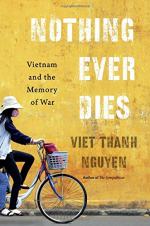|
This section contains 478 words (approx. 2 pages at 400 words per page) |

|
Nothing Ever Dies: Vietnam and the Memory of War Summary & Study Guide Description
Nothing Ever Dies: Vietnam and the Memory of War Summary & Study Guide includes comprehensive information and analysis to help you understand the book. This study guide contains the following sections:
This detailed literature summary also contains Topics for Discussion on Nothing Ever Dies: Vietnam and the Memory of War by Viet Thanh Nguyen.
The following version of this book was used to create this study guide: Nguyen. Viet Thanh. Nothing Ever Dies: Vietnam and the Memory of War. Harvard University Press, 2016.
Nothing Ever Dies: Vietnam and the Memory of War by Viet Thanh Nguyen uses the Vietnam War as a model to critique the ways in which wars are remembered and offer an alternative ethical model. The book rests on Nguyen’s assertion that wars are fought twice, once on the battlefield and a second time in the memory of the individuals and societies involved. Accordingly, he calls for a “just memory,” both to ethically remember past wars and prevent future ones.
The author begins by rejecting the simplistic ethical models that he believes are insufficient for establishing a just memory. The first is the ethics of remembering one’s own, which portrays one’s own nation as heroes while dehumanizing the other. He also rejects the common alternative to this model, the ethics of remembering others. Though this ethics acknowledges the suffering of the others, it views them solely as victims and dehumanizes one’s own. He argues that unjust memory is further encouraged by national “industries of memory.” In addition to their war machines, he states that all nations have a comparable industry of memory, which produces and disseminates the preferred memory of the country’s elites. The American industry of memory is dominated by Hollywood, whose films justify and glorify war. Like the U.S. military, the American memory industry is extremely powerful and influences the collective memory of other nations. The Vietnamese industry of memory, by contrast, relies on tourists visiting Vietnamese territory, where its smaller museums and memorials maintain an advantage.
In contrast, Nguyen’s conception of a just memory incorporates two major ideas. The first is ethical forgetting. The author states that forgetting is an essential part of memory and life in general. Simultaneously, it can be used intentionally to foreground preferred memories. Ethical memory, therefore, requires an ethical approach to forgetting to ensure that none of war’s participants are marginalized or forgotten. Secondly, he argues that just memory requires us to acknowledge that inhumanity and humanity are always present in all human beings. Often, we erroneously view war as a contest between pure good and pure evil. In doing so, we assume that inhumanity and humanity are separate and thus ignore our own capacity to harm others. Even if we humanize others, we risk justifying war in order to protect them from perceived evils. To encourage just memory, he suggests a cosmopolitan education that both humanizes others and makes us aware of our ability to cause harm. In presenting his arguments, Nguyen draws extensively from other critics and literature about the Vietnam War. To a lesser extent, he also cites examples from the Cambodian genocide and the history of South Korea.
Read more from the Study Guide
|
This section contains 478 words (approx. 2 pages at 400 words per page) |

|



